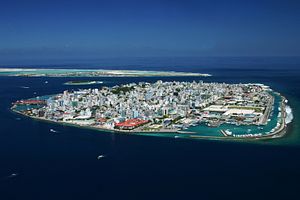The Maldives has declared a state of crisis after a fire damaged the lone water sewage treatment plant in the country’s capital, leaving some 100,000 without access to safe drinking water. The small archipelago state in the Indian Ocean has appealed for any and all aid from neighbors India and Sri Lanka, and also to the United States and China. Almost one third of the country’s 350,000 residents live in the capital of Male. According to Reuters, the fire at the water sewage treatment plant has left no tap water safe for human consumption in Male, the country’s capital.
So far, India has been the swiftest to respond to its southern neighbor’s call for help. India has dispatched five planes carrying bottled water and two additional ships with spare parts and mechanics to assist in fixing the damaged machinery at the water sewage treatment plant. Syed Akbaruddin, the spokesperson for the Indian foreign ministry, noted that he was contacted by the foreign minister of the Maldives with a direct plea for help. “Last night, the Maldives foreign minister contacted us saying they were facing a grave emergency,” Akbaruddin said. “For the next seven to eight days they are going to face extreme difficulty with water so they requested all assistance,” he added.
According to reports out of New Delhi, Indian Prime Minister Narendra Modi and Indian External Affairs Minister Sushma Swaraj have pledged India’s full support to the Maldives. The Indian High Commission in Male issued a statement noting that “Mindful of the strong, friendly and close relations between India and the Maldives, India reacted with alacrity and promptness to the request from the Maldives for timely provision of water.” According to the Economic Times, the first Indian aircraft arrived in Male at 1:15 p.m. on Friday with an initial shipment of bottled water.
According to Reuters, the Maldivian Red Crescent has deployed a couple dozen staff with 60 volunteers to aid in the distribution of bottled water. The incident could prove damaging to the Maldive’s reputation as a tourist hotspot in the Indian Ocean. Despite its population for around 350,000, over a quarter million tourists visit the country each year.
The crisis in the Maldives presents an opportunity for India to demonstrate its capacity to serve as the Indian Ocean’s “first responder” in times of crisis. In recent months, Indian commentators and observers have grown concerned at China’s inroads into the Indian Ocean region. For example, before his visit to New Delhi in September, Chinese President Xi Jinping stopped over in both Sri Lanka and the Maldives, concluding a series of economic and strategic agreements. Similarly, over a month ago, a Chinese submarine was spotted visiting a port in Sri Lanka. With its swift response to this crisis, India demonstrates behavior commensurate with its ambitions for regional leadership.
For the Maldives, the crisis could turn into a major long term problem should the water sewage treatment plant’s repairs prove more complex than initially foreseen. While current estimates predict that repairs could take up to a week, a longer period of repair could lead to grave economic consequences and a broader political crisis. The situation in Male further highlights how vulnerable small island nations with no natural freshwater sources can be to similar accidents.
Update: According to a tweet posted by the Maldives foreign ministry, China will send water assistance via commercial flights on Saturday.

































